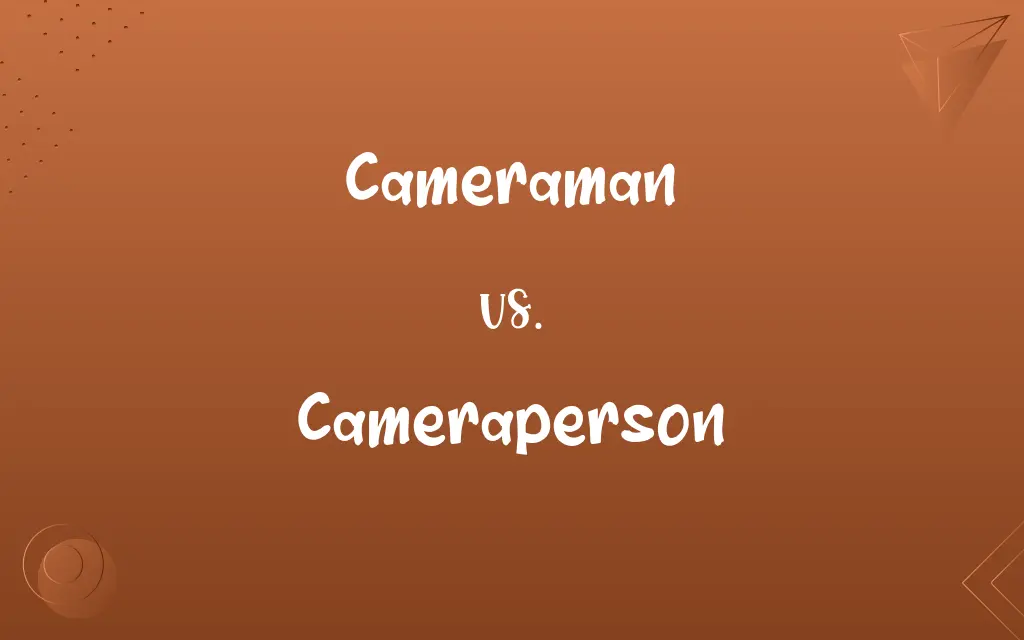Cameraman vs. Cameraperson: Know the Difference

By Hifza Nasir & Dua Fatima || Updated on March 4, 2024
Cameraman traditionally refers to a male operating a camera, especially in film/TV, while cameraperson is a gender-neutral term for anyone performing this role.

Key Differences
Cameraman is a term that has been traditionally used to describe a professional responsible for operating a camera, particularly in the contexts of film, television, and broadcasting. This term specifically implies a male gender. Whereas, cameraperson is a more modern, inclusive term that serves the same professional function without specifying the operator's gender. It reflects an industry shift towards gender neutrality and inclusivity.
Hifza Nasir
Mar 04, 2024
The role of a cameraman or cameraperson involves not just operating the camera but also understanding the technical aspects of filming, including angles, lighting, and composition, to effectively capture the vision of the director or producer. While the term cameraman historically dominated, the adoption of cameraperson acknowledges the presence and contributions of all genders in the field.
Dua Fatima
Mar 04, 2024
Professional environments and job postings have increasingly adopted the term cameraperson to promote equality and avoid gender bias. This change is part of a broader movement within many industries to use language that does not presuppose gender, especially in job titles. It recognizes that the ability to perform the duties of operating a camera is not limited by one's gender.
Hifza Nasir
Mar 04, 2024
The core responsibilities and skills required for the role remain unchanged. Both terms denote a professional skilled in capturing visual content through a camera. The choice between cameraman and cameraperson often depends on the context and the preference for gender-neutral language.
Hifza Nasir
Mar 04, 2024
The evolution from cameraman to cameraperson also mirrors societal changes and the increasing awareness of gender identities beyond the traditional male-female binary. It signifies an understanding that language can shape perceptions and inclusivity within professional settings and society at large.
Hifza Nasir
Mar 04, 2024
ADVERTISEMENT
Comparison Chart
Definition
Traditionally, a male professional who operates a camera in film, TV, or broadcasting.
A gender-neutral term for a professional who operates a camera, regardless of gender.
Dua Fatima
Mar 04, 2024
Gender Implication
Implies a male operator.
Gender-neutral, does not imply any gender.
Hifza Nasir
Mar 04, 2024
Professional Function
Operating camera equipment, understanding filming techniques.
Same as cameraman, without implying gender.
Hifza Nasir
Mar 04, 2024
Usage Trend
Historically prevalent, now becoming less common in favor of more inclusive terms.
Increasingly used to promote gender neutrality and inclusivity.
Dua Fatima
Mar 04, 2024
Industry Impact
Reflects traditional gender roles in film and broadcasting industries.
Reflects modern shifts towards inclusivity and equality in professional environments.
Shumaila Saeed
Mar 04, 2024
ADVERTISEMENT
Cameraman and Cameraperson Definitions
Cameraman
Focuses on technical aspects of filming.
A skilled cameraman adjusts the lens for perfect clarity.
Hifza Nasir
Mar 04, 2024
Cameraperson
A professional in camera operation, irrespective of gender.
The cameraperson captured stunning scenes for the documentary.
Dua Fatima
Mar 04, 2024
Cameraman
Often collaborates with directors and producers.
The film's success was partly due to the cameraman's creativity.
Dua Fatima
Mar 04, 2024
Cameraperson
Works across various media formats.
The cameraperson's work in the news segment was highly commendable.
Shumaila Saeed
Mar 04, 2024
Cameraman
Reflects traditional gender-specific job titles.
Historically, the term cameraman was used regardless of the operator's gender.
Dua Fatima
Mar 04, 2024
ADVERTISEMENT
Cameraperson
Recognized for technical and creative skills.
The cameraperson collaborated closely with the director on the film's visual style.
Dua Fatima
Mar 04, 2024
Cameraman
A male professional specializing in operating camera equipment.
The cameraman expertly captured the live event.
Shumaila Saeed
Mar 04, 2024
Cameraperson
Emphasizes inclusivity in professional titles.
As a cameraperson, she brings a unique perspective to her work.
Hifza Nasir
Mar 04, 2024
Cameraman
Traditionally used in film, TV, and broadcasting.
He has been a leading cameraman in the television industry for years.
Hifza Nasir
Mar 04, 2024
Cameraperson
Symbolizes progress in gender-neutral language.
Using the term cameraperson reflects a commitment to inclusivity.
Hifza Nasir
Mar 04, 2024
Repeatedly Asked Queries
What is a cameraman?
A cameraman is traditionally a male professional who operates camera equipment, mainly in film, television, and broadcasting.
Dua Fatima
Mar 04, 2024
How has the industry responded to the shift from cameraman to cameraperson?
The industry has increasingly adopted the term cameraperson in job postings and professional discourse, aligning with broader movements towards gender neutrality.
Shumaila Saeed
Mar 04, 2024
What does cameraperson mean?
Cameraperson is a gender-neutral term for someone who operates a camera, emphasizing inclusivity and not specifying the operator's gender.
Hifza Nasir
Mar 04, 2024
Why is the term cameraperson preferred over cameraman?
The term cameraperson is preferred for its gender neutrality, reflecting modern values of inclusivity and equality in professional environments.
Hifza Nasir
Mar 04, 2024
Do cameramen and camerapersons have different responsibilities?
No, both terms describe professionals with the same responsibilities and skills in camera operation; the difference lies in the gender implication of the terms.
Dua Fatima
Mar 04, 2024
How do individuals in the industry feel about the term cameraperson?
Many individuals support the use of the term cameraperson for its inclusivity, although preferences can vary based on personal beliefs and the context of the discussion.
Hifza Nasir
Mar 04, 2024
Has the role of the cameraperson evolved with technological advancements?
Yes, the role of the cameraperson has evolved significantly with advancements in technology, requiring ongoing learning and adaptation to new equipment and filming techniques.
Hifza Nasir
Mar 04, 2024
Can a woman be called a cameraman?
While traditionally the term cameraman has been used regardless of gender, the modern and more appropriate term for a woman in this role is cameraperson, to avoid gender-specific implications.
Hifza Nasir
Mar 04, 2024
What skills are important for a cameraperson?
Important skills for a cameraperson include technical proficiency with camera equipment, a good eye for composition, understanding of lighting, and the ability to work collaboratively with creative teams.
Shumaila Saeed
Mar 04, 2024
Is the use of cameraperson common in all media industries?
Yes, the use of cameraperson is becoming increasingly common across various media industries, including film, television, and digital media, to promote gender inclusivity.
Hifza Nasir
Mar 04, 2024
Does the transition to cameraperson signify broader changes in society?
Yes, the transition to using terms like cameraperson reflects broader societal changes towards recognizing and respecting gender diversity and promoting inclusivity.
Dua Fatima
Mar 04, 2024
Are there any challenges associated with transitioning from cameraman to cameraperson in professional language?
Challenges may include changing established norms and practices, as well as educating those within and outside the industry about the importance of inclusive language.
Dua Fatima
Mar 04, 2024
What impact does the choice of term (cameraman vs. cameraperson) have on workplace culture?
The choice of term can significantly impact workplace culture by promoting a more inclusive environment that values diversity and equality.
Hifza Nasir
Mar 04, 2024
Can the term cameraperson help attract a more diverse workforce?
Yes, using gender-neutral terms like cameraperson can help attract a more diverse workforce by signaling an inclusive and welcoming work environment.
Dua Fatima
Mar 04, 2024
Share this page
Link for your blog / website
HTML
Link to share via messenger
About Author
Written by
Hifza NasirCo-written by
Dua Fatima






























































